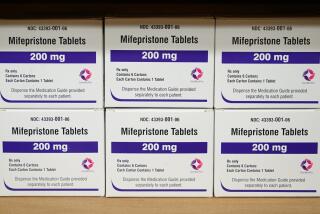Avastin, the FDA and a question of effectiveness (not hope)
- Share via
Avastin is known as a cancer fighter, but its biggest battles lately have been with the Food and Drug Administration. In the latest round, an FDA panel unanimously ruled that the drug should no longer be approved for the treatment of metastatic breast cancer.
The decision — which could still be overruled but probably won’t be — may feel like a defeat for those who want to throw everything possible at breast cancer. But it’s also a reminder that in health policy, numbers carry more weight than hope. And in this case, the numbers don’t seem to be on Avastin’s side.
FDA panels cast votes all the time, but this one stood out for the drama: In two days of testimony before the decision, women told the panel that Avastin saved their lives. Denying the drug to other women, they said, would be like handing out a death sentence.
Although doctors could still prescribe the drug “off-label,” many private insurance companies likely would no longer cover it. (For now, Medicare says it will continue to cover the drug no matter what the FDA finally rules.) Avastin costs roughly $8,000 a month, notes the Dr. Susan Love Research Foundation. So no insurance generally means no medicine.
These stories matter. We all cheer women who have fought breast cancer and lived beyond expectations. And many of us personally know women who ended up on the losing side of the fight.
Elaine Herscher, a writer living in Berkeley, feels for all women with breast cancer. She had the disease herself and took Avastin for a year as part of a clinical trial. Her tumor regressed, to the great relief of her family and friends (me included). “It’s a shock to wake up and learn that the FDA has ruled against something that you thought helped save your life,” she says. “But I believe in science. If it doesn’t work, it doesn’t work.”
Avastin (generic name bevacizumab) is a genetically engineered drug that cuts off the blood supply to a tumor. It’s often prescribed to treat cancers of the lungs and colon, and studies show that it can slow down the growth of tumors in the breast by perhaps several months. That’s a good thing.
But clinical trials by Genentech, the maker of the drug, never proved that breast cancer patients who took the drug lived any longer than those who had standard treatments. The drug didn’t seem to improve quality of life either, which is always a major goal when dealing with a potentially fatal disease.
The panel certainly gave some thought to the women who were no longer around to testify. Not only have some women died while taking Avastin, some may have died, at least in part, because of the drug. A study published in the Journal of the American Medical Assn. in February concluded that combining Avastin with certain common chemotherapy agents more than tripled the risk of fatal complications including perforated bowels and uncontrolled bleeding.
Dr. Michael Naughton, a breast cancer specialist and assistant professor of medicine at the Washington University School of Medicine in St. Louis, says he’s “disappointed” with the ruling because some women do seem to respond to the drug.
“A lot of patients aren’t helped at all, but there’s a small number who are helped a lot,” he says. If doctors had a better way of predicting who would benefit from Avastin, he adds, much of the controversy would disappear.
But until then — until researchers can show that Avastin actually saves the lives of breast cancer patients — the FDA ruling is likely to stand. To quote one expert who knows more about this topic than she ever wanted to: If it doesn’t work, it doesn’t work.






